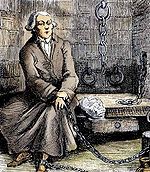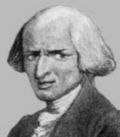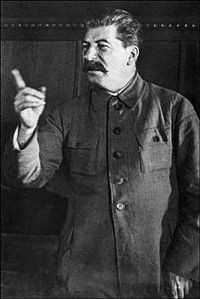
The history of atheism can be dated to as early as the 5th century B.C. Diagoras of Melos was a 5th century BC. Greek atheist, poet and sophist.
The word atheism itself was not coined until the 16th century.[2]
One of the early examples of atheism/agnosticism/nontheism involve Eastern religions such as Jainism, Buddhism and Taoism, which do not include a deity. These date back to the 6th century BC, but there is some dispute over whether these religions can be classified as atheistic, in the sense of denying the existence of gods, as many other branches of these religions do incorporate deity worship. In some such religions, the question of the existence of gods is considered to be unimportant rather than a question which can be answered one way or the other. This stance can be better described by the neologism apatheism.
As noted earlier, atheism can also be traced to Ancient Greece in the 5th century BC. Diagoras of Melos is often referred to as "The First Atheist", and other men who claimed to be atheists include Theodorus of Cyrene and Euhemerus. Epicurus and Lucretius, who are often described as atheists, believed that the gods existed but that they were unconcerned with human affairs: a position better described as Deism than atheism. Protagoras espoused a position which we would describe today as agnosticism, stating that "With regard to the gods I am unable to say either that they exist or do not exist."[3] At the time, however, atheism was a capital offense in Greece—it was the crime for which Socrates was executed, though he denied the charge. It is therefore possible that some individuals may have concealed their true beliefs.
In Medieval and Renaissance Europe, instances of atheism are rare. The existence of arguments put forward to demonstrate God's existence by Aquinas, Anselm and others suggests that non-belief was not unheard of, but few records of it are known.
Modern atheism did not begin until the Enlightenment. In addition, the French Revolution increased the spread of atheism in Europe.[4] Baron D'Holbach's book The System of Nature was the first publication which explicitly denied the existence of God. Other atheists from this time included the philosopher David Hume. Others denied being atheists (heresy and blasphemy were capital offences) but held materialistic, empiricist, broadly deistic views; these include Voltaire, Thomas Hobbes, Thomas Paine, John Locke, Immanuel Kant and Benjamin Franklin.
Contents
- 1 French Revolution and atheism
- 2 Golden Age of Freethought
- 3 Atheistic communism and the 20th century history of atheism
- 4 Effect of atheism on societies
- 5 Atheism and abortion
- 6 Women and the history of atheism
- 7 Atheism and religion
- 8 Atheist movement's 20th century past and its present day lack of confidence
- 9 Schools of atheist thought
- 10 Notable atheists
- 11 Atheism and culture
- 12 Atheist organizations
- 13 See also
- 14 External links
- 15 Recommended Reading
- 16 References
French Revolution and atheism[edit]

See also: French atheism
The University of Cambridge reports the following historical relationship between atheism and the French Revolution:
| “ | Between 1700 and 1750 thousands of atheistic clandestine manuscripts circulated across Europe (although still only read by a very small minority)...
The French Revolution (1789-94) would dramatically transform the power relationship between belief and unbelief in Europe: whereas before atheism had been 'high brow', discussed in the cafes and salons of Paris, henceforth it would set itself down among the people. A strident unbelief became a real political factor in public life, as the anticlerical 'dechristianisation' period following the revolution would demonstrate. The impact of the French Revolution in inspiring people to put the irreligious ideas of the Enlightenment into practice would extend beyond France to other European countries, and to the American colonies (although in the latter it would take a deistic rather than atheistic form).[5] |
” |
The Reign of Terror of the French Revolution established established a state which was anti-Roman Catholicism/anti-Christian in nature[6] (anti-clerical deism and anti-religious atheism and played a significant role in the French Revolution),[7][8] with the official ideology being the Cult of Reason; during this time thousands of believers were suppressed and executed by the guillotine.[9]
Kenneth Weinstein wrote in The American Interest:
| “ | Charlie Hebdo has suddenly become the best-known example of a venerable French tradition: vituperative and unrelenting anti-religious satire, a provocative yet regular phenomenon of French public life. And now—not, alas, for the first time in that nation’s history—it has occasioned actual bloodshed.
Lampooning of the Bible, Christian doctrine, and clergy dates back almost 400 years to the “strong thinkers,” French learned skeptics in the 16th century. The primary target of anti-religious satire was France’s official religion, Catholicism, the Church’s ties to the state, and its control over education. And the ridiculing wit long directed against these targets would eventually play a central and crucial role in reducing the status and influence of religion in the French Republic... The method of the forerunners of Charlie Hebdo—unrelenting and vicious satire of religion and clergy — proved so effective that France became a fully secular state, to such an extent that certain of its practices, laicité, would be regarded as unsettlingly alien and intolerant by most Americans.[10] |
” |
- See also: Atheism and mockery
Golden Age of Freethought[edit]
See also: Golden Age of Freethought
The Golden Age of Freethought describes the 19th century United States socio-political movement which promoted freethought. Generally speaking, the period from 1875 to 1914 is referred to as "the high-water mark of freethought as an influential movement in American society".[11]
Politically, the atheist movement has leaned left in its politics (See: Secular left and Atheism and politics). Secular leftist utopianism and its exalted view of human nature did not line up with the horrors of the World War I. The Golden Age of Freethought ended at the start of World War I.
Atheistic communism and the 20th century history of atheism[edit]
See also: Militant atheism and Atheism and communism
According to the University of Cambridge, historically, the "most notable spread of atheism was achieved through the success of the 1917 Russian Revolution, which brought the Marxist-Leninists to power."[12] Vitalij Lazarʹevič Ginzburg, a Soviet physicist, wrote that the "Bolshevik communists were not merely atheists but, according to Lenin's terminology, militant atheists."[13]
Global decline of atheism in the 20th and 21st centuries[edit]
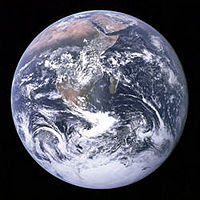
See also: Global atheism and Desecularization
Atheists as a percentage of the world's population have declined since 1970 and atheism is expected to face long term decline.[14][15][16][17]
On July 24, 2013, CNS News reported:
| “ | Atheism is in decline worldwide, with the number of atheists falling from 4.5% of the world’s population in 1970 to 2.0% in 2010 and projected to drop to 1.8% by 2020, according to a new report by the Center for the Study of Global Christianity at Gordon-Conwell Theological Seminary in South Hamilton, Mass."[18] | ” |
The collapse of the atheistic Soviet Union in 1991 caused a large drop in the percentage of atheists in the world's population.[19]
China has the largest atheist population and Christianity is rapidly growing in China (see: Growth of Christianity in China).
Furthermore, in secular Europe, due to the higher fertility rate of religious immigrants, the sub-replacement fertility of the secular population, the resistance of religious immigrants to assimilation and retiring workers needing to be replaced, Europe is expected to go through a process of desecularization in the 21st century.
The American sociologist and author Peter L. Berger introduced the concept of desecularization in 1999.[20][21]
Oppression in atheistic communist regimes[edit]
- See also: Atheism and mass murder, Atheism and communism, Atheistic communism and torture, and Atheism vs. Christianity
The atheism in communist regimes has been and continues to be militant atheism and various acts of repression including the razing of thousands of religious buildings and the killing, imprisoning, and oppression of religious leaders and believers.[22]
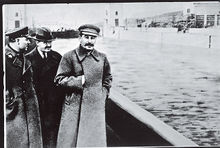
It has been estimated that in less than the past 100 years, governments under the banner of communism have caused the death of somewhere between 40,472,000 and 259,432,000 human lives.[24] Dr. R. J. Rummel, professor emeritus of political science at the University of Hawaii, is the scholar who first coined the term democide (death by government). Dr. R. J. Rummel's mid estimate regarding the loss of life due to communism is that communism caused the death of approximately 110,286,000 people between 1917 and 1987.[25]
Secular leftists, the Soviet Union and historical revisionism[edit]
See also: Atheism and historical revisionism
Secular leftists have a long-standing history of engaging in historical revisionism (see: Atheism and historical revisionism).
In terms of academic and popular history, the Communist Party of the Soviet Union (CPSU) often engaged in historical revisionism via their control of political/ideological public discourse (media, education, etc.) and via the monitoring/silencing/imprisonment/persecution of citizens through the KGB.[26]
During and subsequent to the rule of Nikita Khrushchev (1956–64), there was competition between the pro-Stalinists and anti-Stalinists in terms of how Soviet history was portrayed.[27]
Effect of atheism on societies[edit]
See also: Atheism and culture and Atheism statistics and Christianity vs. atheism statistics
Atheism has a negative effect on societies culture (see: Atheism and culture).
Various social science studies, historical data and other data, demonstrate that atheism often has a harmful effect on individuals and societies (See: Atheism statistics and Christianity vs. atheism statistics).
Atheism and abortion[edit]
See also: Atheism and sadism and Abortion and atheism
The father of medicine, Hippocrates, expressly prohibited abortion in his ethical Oath long before Christianity.
The Journal of Medical Ethics declares concerning the atheist and sadist Marquis de Sade, who was imprisoned a number of times before being committed to an insane asylum:
| “ | In 1795 the Marquis de Sade published his La Philosophic dans le boudoir, in which he proposed the use of induced abortion for social reasons and as a means of population control. It is from this time that medical and social acceptance of abortion can be dated, although previously the subject had not been discussed in public in modern times. It is suggested that it was largely due to de Sade's writing that induced abortion received the impetus which resulted in its subsequent spread in western society."[29] | ” |
Women and the history of atheism[edit]
See also: Atheism and women
In the 1770s, the French philosopher Paul-Henri Thiry observed a dearth of female atheists.[30] The English poet Edward Young (June 5, 1681 – April 5, 1765) wrote to satirically signal earthly apocalypse: "Atheists have been rare, since nature’s birth; Till now, she-atheists ne’er appear’d on earth."[31] In a letter written in the 1760s, the English essayist Bonnell Thornton wrote: "Good God! A Female Atheist! … One is not half so shocked at the idea of a Female Murderer; A Female Murderer, in the worse of senses, of her own children, of herself."[32] In 1813, the prominent doctor Thomas Cogan (founder of the Royal Humane Society) declared: "Men contemplate a female atheist with more disgust and horror than if she possessed the hardest features embossed with carbuncles."[33]
Atheism and religion[edit]
Contrary to the opinions of evangelical atheists, atheism is a religion which has repeatedly attempted to take away the religious liberties of Christians in order to support their false religion.[34] Using unproven theories, Darwinists indoctrinate youths in the United States in high school and college. Although atheists claim that atheism is not a religion the U.S. Supreme Court has ruled that atheism is a religion as it fits in with its definition, distinguishing between “religions based on a belief in the existence of God [and] religions founded on different beliefs."[35]
See also:
Atheism and the persecution of homosexuals
Atheist movement's 20th century past and its present day lack of confidence[edit]
See also: Atheist movement and Atheist factions
In 2010, Professor Eric Kaufmann, who specializes in the study of religion/irreligion/demographics/politics, wrote:
| “ | Worldwide, the march of religion can probably only be reversed by a renewed, self-aware secularism. Today, it appears exhausted and lacking in confidence... Secularism's greatest triumphs owe less to science than to popular social movements like nationalism, socialism and 1960s anarchist-liberalism. Ironically, secularism's demographic deficit means that it will probably only succeed in the twenty-first century if it can create a secular form of 'religious' enthusiasm."[36] | ” |
In the latter portion of the 20th century and continuing into the 21st century, the atheist movement has had lower confidence/morale due to various historical events/trends (see: Atheists and the endurance of religion).
Decline of the atheist movement[edit]
Schools of atheist thought[edit]
see: Schools of atheist thought and Atheist factions
Notable atheists[edit]
Some historically notable atheists include:
- Epicurus (341-270 BCE), Greek philosopher.
- Thomas Hobbes, author of Leviathan in 1651.
- John Baskerville (1706-1775)
- Charles Watts, author (1836-1906)
- Robert G Ingersoll, lawyer and author (1833-1899)
- Stephen Gerard (1750-1831)
- Allen Pinkerton (1819-1884)
- Émile Durkheim (1858-1917) from Épinal, France
- Alfred Radcliffe-Brown (1881-1955) from Birmingham, United Kingdom
Modern atheists include:
- Bruce Lee (1940-1973)
- George Carlin (1937-2008)
- Warren Buffet
- George Soros
- Mark Zuckerberg
- Bill Maher
- James Murdoch
- Burkeley Breathed (comic strip writer)
- Simon Patterson (English artist)
Atheism and culture[edit]
Culture consists of the "language, habits, ideas, beliefs, customs, social organization, inherited artifacts, technical processes, and values."[37]
Atheism has had a number of negative effects on the culture of atheistic societies and in terms of its effects on theistic societies which have been influenced by atheistic ideologies (see: Atheism and culture).
Atheist organizations[edit]
See also[edit]
- Atheism and its anti-civilizational effects
- Atheism, women and history
- Atheist worldview
- Atheism and beliefs
- Atheism and deception
- History of agnosticism
External links[edit]
Recommended Reading[edit]
- Dimitry Pospielovsky, (December, 1987), A History of Marxist-Leninist Atheism and Soviet Antireligious Policies, Palgrave Macmillan, ISBN 0312381328
- Dimitry Pospielovsky, (November, 1987), Soviet Antireligious Campaigns and Persecutions (History of Soviet Atheism in Theory and Practice and the Believers, Vol 2), Palgrave Macmillan, ISBN 0312009054
- Dimitry Pospielovsky, (August, 1988), Soviet Studies on the Church and the Believer's Response to Atheism: A History of Soviet Atheism in Theory and Practice and the Believers, Vol 3, Palgrave Macmillan, hardcover: ISBN 0312012918, paperback: ISBN 0312012926
References[edit]
- ↑ http://www.hawaii.edu/powerkills/COM.ART.HTM
- ↑ https://www.merriam-webster.com/dictionary/atheism
- ↑ Cicero, De Natura Deorum
- ↑ http://www.investigatingatheism.info/historyeighteenth.html
- ↑ The material was formerly at the University of Cambridge's Investigation Atheism website. A website which closed down. The material has been transferred to 18th Century History, Investigating Atheism
- ↑
- Tallet, Frank Religion, Society and Politics in France Since 1789, pp. 1-17 1991 Continuum International Publishing
- SPIELVOGEL, Jackson Western Civilization: Combined Volume p. 549, 2005,Thomson Wadsworth
- Latreille, A. FRENCH REVOLUTION, New Catholic Encyclopedia v. 5, pp. 972–973 (Second Ed. 2002 Thompson/Gale) ISBN 0-7876-4004-2
- ↑ War, Terror and Resistence
- ↑ Forging Freedom: The Life of Cerf Berr of M Delsheim by Margaret R. O'Leary, iUniverse (June 1, 2012), pages 1-2
- ↑ Multiple references:
"It is wonderful that, amid the horrors of this dismal period, while 'the death dance of democratic revolution' was still in rapid movement, among the tears of affliction, and the cries of despair, 'the masque, the song, the theatric scene, the buffoon laughter, went on as regularly as in the gay hour of festive peace.'”
"It's this second Enlightenment tradition that Cardinal Ratzinger referred to when he wrote, 'The radical detachment of the Enlightenment philosophy from its roots ultimately leads it to dispense with man.' Actually this transition happened not 'ultimately' but almost immediately. The first instance occurred when Enlightenment worship of abstract 'reason' and 'liberty' degenerated quickly into the mass murders committed during the antireligious Reign of Terror in France. 'Liberty, what crimes are committed in your name', said Madam Rolande as she faced the statue of Liberty in the Place de la Revolution movements before her death at the guillotine. She was one of the early victims of a succession of secular systems based on rootless notions of 'liberty', 'equality', and 'reason'.
"As many historians have pointed out, the atheist regimes of modern times are guilty of far more crimes than any committed in the name of religion. Communist governments alone were guilty of more than one hundred million murders, most of them committed against their own people.” - ↑ "Charlie Hebdo and France’s Irreligious Tradition" by Kenneth R. Weinstein
- ↑ Jacoby, Susan. Freethinkers: A History of American Secularism. New York, NY: Metropolitan Books, p. 151
- ↑ Marxism. University of Cambridge (2008). Retrieved on 2011–03–15. “The most notable spread of atheism was achieved through the success of the 1917 Russian Revolution, which brought the Marxist-Leninists to power. For the first time in history, atheism thus became the official ideology of a state.”
- ↑ Vitalij Lazarʹevič Ginzburg (2009). On Superconductivity and Superfluidity: A Scientific Autobiography. Springer Science+Business Media. Retrieved on 2011–03–15. “The Bolshevik communists were not merely atheists but, according to Lenin's terminology, militant atheists.”
- ↑ Study: World is becoming more religious
- ↑ Globally the worldviews of atheism and non-religious (agnostic) are declining while global Christianity is exploding in adherents
- ↑ Gordon-Conwell Theological Seminary - Status of Global Missions
- ↑ Gordon-Conwell Seminary - Status of Global Mission, 2014, in the Context of AD 1800–2025
- ↑ Global Study: Atheists in Decline, Only 1.8% of World Population by 2020
- ↑ CHRISTIAN MARTYRDOM: A GLOBAL DEMOGRAPHIC ASSESSMENT by Todd M. Johnson, Notre Dame, November 2012
- ↑ Journal of Church and State, Desecularization: A Conceptual Framework by Vyacheslav Karpov, 2010
- ↑ Peter L. Berger, “The Desecularization of the World: A Global Overview,” in The Desecularization of the World: Resurgent Religion and World Politics, ed. Peter L. Berger (Grand Rapids: William B. Eerdmans Publishing Company, 1999)
- ↑
- Underground Christians fear China crackdown
- A Century of Violence in Soviet Russia
- On Compromise in the Hierarchy During the Communist Yoke
- Korean Reds Targeting Christians
- North Korean and Chinese Atrocities Against Christians Worsen
- China sends Bible owners to labor camp
- China: Christians Tortured While Under Arrest
- ↑ The Commissar Vanishes
- ↑ Multiple references:
- Anticommunist (April 14, 2004). "The Human Cost of Communism - 100 million". UK Indymedia. Retrieved from June 7, 2013 archive at Internet Achive.
- "The Black Book of Communism". Harvard University, Faculty of Arts and Sciences website: Cold War Studies.
- Rummel, R. J. (November 1993). "How many did communist regimes murder?" University of Hawaii website; Freedom, Democracy, Peace; Power, Democide, and War.
- White, Matthew (February 2011). "Source list and detailed death tolls for the primary megadeaths of the twentieth century". Necrometrics.
- Higgins, David (June 22, 2007). "Memory and ideology: Washington's newest statue is the Victims Of Communism Memorial". Sarasota Magazine website. Retrieved from October 8, 2007 archive at Internet Archive.
- Radosh, Ronald (February 2000). "The Black Book of Communism: Crimes, Terror, Repression". First Things [journal] website.
- ↑ Rummel, R. J. (November 1993). "How many did communist regimes murder?" University of Hawaii website; Freedom, Democracy, Peace; Power, Democide, and War.
- ↑ Klaus Mehnert, Stalin Versus Marx: the Stalinist historical doctrine (Translation of Weltrevolution durch Weltgeschichte) Port Washington NY: Kennikat Press 1972 (1952), on the illegitimate use of history in the 1934–1952 period
- ↑ Roger D. Markwick, Rewriting history in Soviet Russia : the politics of revisionist historiography, 1956–1974 New York ; Basingstoke : Palgrave, 2001, on legitimate Soviet Historiography particularly in the post 1956 period.
- ↑ https://jme.bmj.com/content/6/1/7.abstract
- ↑ https://jme.bmj.com/content/6/1/7.abstract
- ↑ From Hitchens to Dawkins: Where are the women of New Atheism?
- ↑ From Hitchens to Dawkins: Where are the women of New Atheism?
- ↑ From Hitchens to Dawkins: Where are the women of New Atheism?
- ↑ From Hitchens to Dawkins: Where are the women of New Atheism?
- ↑ http://shockawenow.blogspot.com/2011/10/cutting-off-air-supply-of-atheism_573.html
- ↑ http://factschurch.com/sermons/sermon004.html
- ↑ Shall the religious inherit the earth? - Eric Kaufmann
- ↑ Christianity and culture

